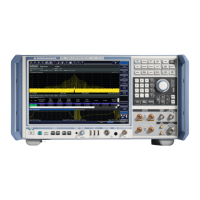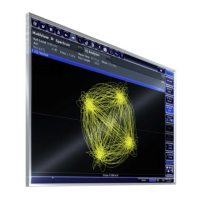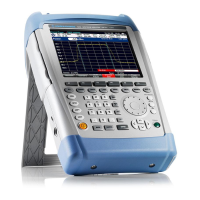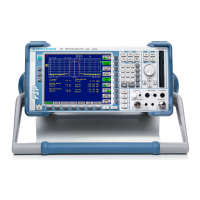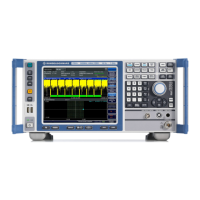Common Measurement Settings
R&S
®
FSW
419User Manual 1173.9411.02 ─ 19
6.6.1 Basics of Triggering and Gated Measurements
Some background knowledge on triggering and gated measurements is provided here
for a better understanding of the required configuration settings.
● Triggered measurements......................................................................................419
● Gated Measurements............................................................................................422
● Determining the Parameters in Preview Mode......................................................425
6.6.1.1 Triggered measurements
In a basic sweep measurement with default settings, the sweep is started immediately
when you start the measurement, for example by pressing the RUN SINGLE key. How-
ever, sometimes you want the measurement to start only when a specific condition is
fulfilled, for example a signal level is exceeded, or in certain time intervals. For these
cases you can define a trigger for the measurement. In FFT sweep mode, the trigger
defines when the data acquisition starts for the FFT conversion.
An "Offset" can be defined to delay the measurement after the trigger event, or to
include data before the actual trigger event in time domain measurements (pre-trigger
offset).
For complex tasks, advanced trigger settings are available:
●
Hysteresis to avoid unwanted trigger events caused by noise
●
Holdoff to define exactly which trigger event will cause the trigger in a jittering sig-
nal
● Trigger Source...................................................................................................... 419
● Trigger Offset........................................................................................................ 419
● Trigger Hysteresis.................................................................................................420
● Trigger Drop-Out Time..........................................................................................420
● Trigger Holdoff...................................................................................................... 421
Trigger Source
The trigger source defines which source must fulfill the condition that triggers the mea-
surement. Basically, this can be:
●
Time: the measurement is repeated in a regular interval
●
Power: an input signal is checked for a defined power level
The trigger signal can be an internal one (the input signal at one of various stages
in the signal analysis process - before or after the input mixer, after the video filter
etc.) or it may come from an external device via one of the TRIGGER INPUT con-
nectors on the front or rear panel of the instrument.
A power sensor can also provide an external trigger, see "Using a Power Sensor
as an External Power Trigger" on page 323.
For details on the available trigger sources see "Trigger Source" on page 427.
Trigger Offset
An offset can be defined to delay the measurement after the trigger event, or to include
data before the actual trigger event in time domain measurements (pre-trigger offset).
Trigger and Gate Configuration

